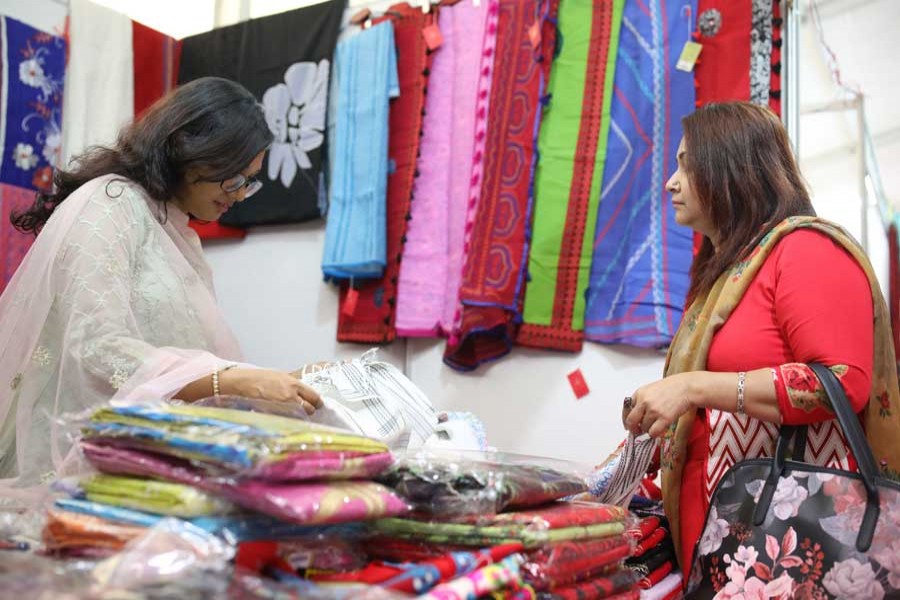Against the backdrop of the on-going SME Fair 2020 in the city and the government's renewed interest to help bolster growth and expansion of the small and medium enterprises (SMEs) sector, the country's industrial progress should get a shot in the arm.
For further development of the country's SME sector, Prime Minister Sheikh Hasina put forth a five-point proposal. Inaugurating the 8th National SME Product Fair 2020 in the capital, the Prime Minister said many of the country's SME products are world standard and they're also associated with our cultural heritage. So, we'll have to undertake some measures for developing the SME sector further, she said.
The nine-day fair at the Krishibid Institution, Bangladesh (KIB) auditorium at Farmgate in the city is now in progress. In her first proposal, the premier said the entrepreneurs will have to concentrate more on producing hundred per cent export-oriented high-end goods side by side our heritage products. Secondly, the SME entrepreneurs will have to manufacture complementary goods to the heavy industries. Thirdly, they should pave the way to flourish the Blue Economy. In the fourth place, she said, the entrepreneurs will have to focus more on turning Bangladesh into a partner of 'Global Value Chain' using a low cost of production in combination with modern technology. Fifthly, she said the country's scientists and researchers will have to give more attention towards coordination/ hybridisation of three innovative sectors -- digital, biological and physical -- so that Bangladesh can keep pace with fourth industrial revolution (4IR).
The prime minister put emphasis on creating more women entrepreneurs, proper utilisation of marine resources, diversification of the products, exploring new markets, setting up food processing industries, producing goods keeping pace with the variation of seasons, generating more employment and ensuring availability of the raw materials.
She suggested that the youths should start small businesses taking loans instead of not running after jobs. The Prime Minister said collateral-free loan is being disbursed from the Karmasangsthan Bank and the SME Foundation to facilitate entrepreneurs in setting up SMEs.
The prime minister has already given directives to the authorities so that women entrepreneurs can get special facilities in the economic zones as she wants males and females to come forward equally. The government wants to give special attention to bring in more female entrepreneurs in SME businesses.
Placing emphasis on strengthening connectivity, Sheikh Hasina said smooth transportation and marketing of products is not possible without it. Keeping this in mind, the country has taken various measures.
New markets have to be explored alongside creating domestic markets. The country has to take initiatives for increased market exploration, she said. The government, she added, has taken steps to build a skilled workforce in the country as the demand of such manpower is high everywhere.
Some moves are already in place in line with the PM's directions. Importance has been given to vocational and technical education, and more technical schools are being set up at upazila level to build such workforce. The SME Foundation has identified 177 clusters of small and medium industries across the country and is rendering entrepreneur training and low rate financing.
The government also framed and adopted necessary laws and policies for further flourishing of the SME sector that among others include reorganising the Bangladesh Small and Cottage Industries Corporation (BSCIC). The SME entrepreneurs will be trained in the BSCIC.
The new Industrial Policy has identified SME as a thrust sector. The industries ministry has set up a SME cell to take up policy and strategies for expansion of the SME sector. The ministry has also formed a SME panel with representatives from the private sector to help the government implement recommendations of the SME Taskforce.
However, a level-playing field for small businesses is important for the generating employment and increasing opportunities for women and the poor. The small business community is often stymied by structural impediments, including over-regulation, corruption, and other aspects of poor governance, as well as by high prices caused by providers of inputs and services, often the state-owned enterprises.
The country's strategy should be to identify impediments to business growth, followed by support to enhance private sector's ability to engage in policy dialogues to move forward the reform agenda.
SMEs have been contributing enormously to the economy of Bangladesh. Thousands of small and cottage industries, set up throughout the country over the years, are ensuring bread and butter to millions without adequate government support. Currently, SMEs account for 40 per cent of gross manufacturing output, 80 per cent of industrial employment and 25 per cent of total labour force. Small industries under leather sector, in spite of various odds and difficulties, account for 70 per cent of export earnings of the sector.
There is a need to create institutional mechanism that can effectively coordinate and implement SME-related policies. The SMEs have problems of their own like financial constraints during start-ups and operations.


